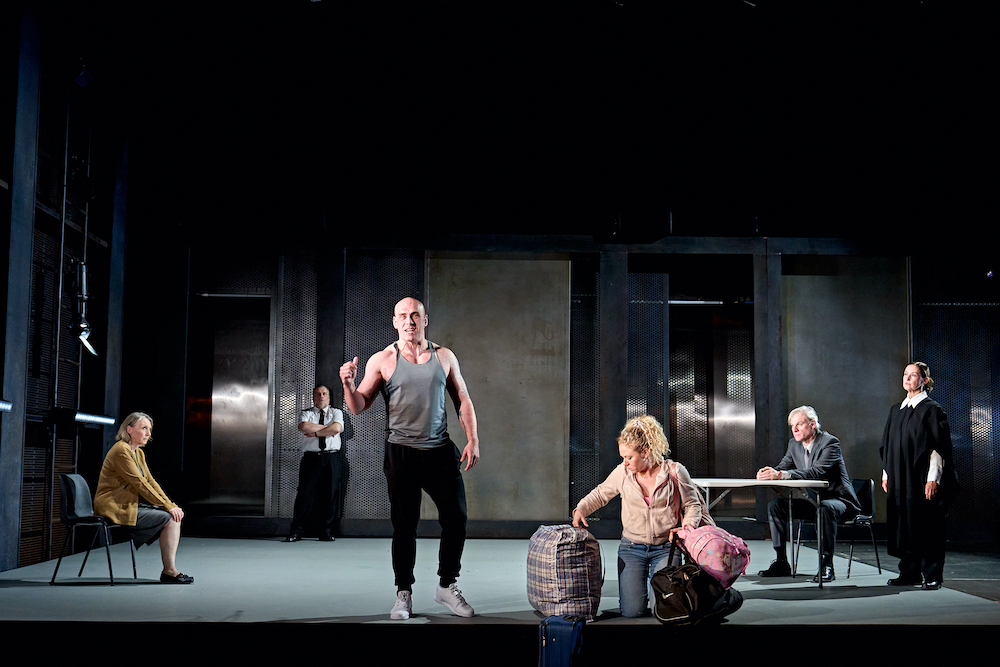
Of the 22 plays I saw last year, Player Kings and Oedipus were at the very top of the list. You can imagine how excited I was to not only see the first Robert Icke original, but at the same time to go to the Royal Court where I had never been before. With every multi-star review that popped up on my news feed, my expectations climbed.
I had missed this story when it dominated the news cycle, and therefore had no idea of the real-life events that Icke had adapted. I was captivated by the powerful opening scene – a caged animal pacing across his prison cell, dropping down to do press ups from time to time. Agitated, aggressive energy projected onto the metal net around him.
The moment we meet Raoul, we immediately experience the violence in him that he so desperately tries to deny. Samuel Edward-Cook, with his clean-shaven head permanently glistening with sweat, is phenomenal as Moat. Seething hatred onto everyone around him, despite the menacing muscles and rage-on-steroids, he speaks with great tenderness about his kids. Not knowing the story, I had started to wonder whether this might be the story of a man, who was falsely accused of hurting his child, because of unfair stereotypes. I was quickly disillusioned, and any lingering doubt disappeared as his girlfriend was hurtling halfway across the stage and into a table.
David Cameron, the then PM, famously said: I cannot understand any wave, however small, of public sympathy for this man. Icke however wants us to acknowledge the fellow human being in Raoul – we learn about his fatherless childhood, about the bipolar mother burning his toys, about the challenges that came with English being his second language. There is anguish and hurt. Maybe there is space for empathy?
If Icke had left it at that – created ambiguity by highlighting the back story; illustrated Moat’s capability for tenderness and caring – the audience could have left the theatre pondering in our own minds where the boundary between bad person and bad deed lies. But unfortunately, slapped onto the end of the play is an epilogue about male suicide and its link to male violence and toxic masculinity. It felt as if Icke wanted to address this pertinent issue, but unable to come up with a completely original narrative, picked a terrifying story and tried desperately to retrofit it to make his original point.
The rising rate of suicide in middle aged men over the last 15 years is an extremely worrying epidemic – cultural expectations of masculinity that discourage emotional vulnerability, social isolation and loneliness, poverty and general mental health stigma are all seen as contributing factors. Icke’s ending creates an inference that that if Moat had received the counselling he had asked for but never participated in, if he had been allowed to cry and show his vulnerabilities to a professional, then his life could have been saved and every life is worth saving.
This is not an easy yarn to spin and the play gradually falls apart, starting from the overly long monologue from David Rathband, the police officer that Moat shot and blinded. To crudely participate in his blindness, the theatre is thrown into darkness and we learn how the tabloids tore his life apart after he cheated on the wife that stood by him through the shooting trauma. As I did not know the story, it was only when the rampage came to an end at Raoul’s own hand that I realised with this scene Icke was drawing parallels between the two men – both added to the male suicide rates, they were both let down by society, they were both victims and villains.
More pontificating came by incorporating the real-life occurrence of footballer Paul Gascoigne turning up when Moat had been surrounded by police. He was apparently completely intoxicated and had no interaction with the fugitive, but in the play, he becomes the therapist that should have supported Moat from the start. This is followed by another hallucinating scene between Raoul and his absentee father. With actors playing multiple roles and these characters not really fitting into the narrative, it all becomes confusing and difficult to follow. Thankfully however Moat explains to the audience that these conversations never happened; I can only presume we are meant to reimagine what Moat could have been with the right support from the system and a present, loving dad.
Icke’s attempt to create resonance failed with me. When at the end, the police officer tries to convince Raoul to hand himself in, the only thought going through my mind was: don’t risk your own life for this monster, the world will be a better place without him in it.
It is hard not to draw parallels between this play and Punch, which deals with broadly similar topics, and is also based on actual events. The extension of its run and the committed transfer to the West End before the season was done, was meteoric. Before going to see Manhunt, I had been wondering, why it was not getting a similar treatment despite the rave reviews. And now I know the answer. There are too many theatrical devices; too many topics are hinted at but never fully explored; the characters are hard to define and often it is unclear who they actually are or what role they are mean to play; it feels to gimmicky. Unlike the razor sharp, brilliantly modernised greats to which Icke is able to add a phenomenal clarity, his own play is an opaque muddle that lacks subtlety and therefore fails to influence emotions.
Leave a Reply